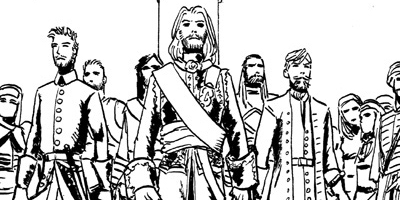
Click on thumb to see full
Our EXTRA-SIZED FINALE ISSUE continues on!
As always, you can also go to the dedicated Al’Rashad site.
4
Nov

Our EXTRA-SIZED FINALE ISSUE continues on!
As always, you can also go to the dedicated Al’Rashad site.
"[O]ne of the funniest bloggers on the planet... I only wish he updated more."
-- Popcrunch.com
"By MightyGodKing, we mean sexiest blog in western civilization."
-- Jenn

Related Articles
7 users responded in this post
… wait, Ayana and Alric?
I’m sorry, but… how does that make sense?
That marriage is going to incense purists in both nations, because any child of that union is, if I understand how these things typically work, going to be heir to both.
Indeed, even people in both Gundring and the Caliphate who are broadly in favor of an alliance are going to be somewhat perturbed by the idea of political union with a faraway nation that is composed of a different ethnic group that worships differently than they do.
The logical marriage alliance here isn’t Ayana and Alric. It’s Ayana and Wulf. That ties the kingdoms together while minimizing the risk of political union (or the difficulties in deciding you don’t want a political union and maybe one of your kids going “no, fuck you, I want the whole bag of marbles, civil war time”) while still being high-ranking enough on both sides that nobody gets slighted.
I don’t see anything Alric brings to the table that Wulf doesn’t bring with greater advantages and fewer drawbacks. The only disadvantage I can see is that Wulf and Alja are very much in love, but, well, welcome to international diplomacy, suck it up.
Although I suppose there’s the possibility Alric and Ayana never intend to ever get married. That historical aside uses an awful lot of weasel words on the subject. They can only play that game for so long, tho, people are going to expect heirs. Presumably non-bastard heirs.
I’m not certain. but my impression is that the Gundring political structure doesn’t have to pass from father to son. Plus assuming that Aliric isn’t bi, any child of Ayana probably doesn’t have a lot of Gundring in them, no matter what the official line is.
So Ayana’s children, who are *officially* half Gundring, retain control of the Caliphate, while Alaric’s brother and nephews eventually take control of their house, with which may come control of their nation. And there is probably some heavy cross-fostering between the cousins.
Then again, Chris may have something up his sleeve for one of the other arcs.
What does Alric being bi have to do with him fathering heirs? Plenty of gay men have had children, in many cases multiple children. The presence of offspring doesn’t dispositively prove a single thing about your sexual orientation.
Splitting the polities is a possibility, but it depends on the kid(s) who could potentially be heirs to both deciding to not assert their rights, which triggers a political crisis.
Also, if Ayana pops out only children who don’t look even a little bit Gundring, that is going to cause a shit-ton of trouble for Alric at home. Plenty of people will be incensed that the “Rashadi whore” has “given our good and trusting King horns.” It doesn’t matter if Alric and Ayana are in on the scam, lots of other people (in many cases very patriotic and well-meaning ones) will not be.
Basically, Alric/Ayana seems to have a whole lot of potentially explosive complications to it that Wulf/Ayana does not.
There are a couple of things in the art that bear mention. First, the guy on Alric’s right hand is dressed in a very nice Swedish uniform of Charles XII’s time. That is a really nice ethnic touch, as that uniform was not used by any other military. It is as iconic (and much more historical) than a horned Viking helmet. This kind of detail shows how much work the authors have put in.
As an in-story point, I can’t help noticing the posture of the bridal pair during the bethrothal agreement. It signals very clearly that in the right of Al-Rashad, Alric’s going to be a prince consort, not a co-regent. It might also signify that the Rashadi-Gundring alliance is not going to be a completely equal one. To know this, we should see the same scene performed in Gundring: would Alric stand by the throne, with Rayana mounting the steps? Yet, Alric holds a high dignity. His other foot is on the second highest step of the throne. Dalakhra, a high noble and advisor to the Caliph, never mounted even the lowest step of the throne.
Second, we should know the previous diplomatic position. Empires such as Al-Rashad do not usually exist in a Westphalian world order where all states hold theoretically equal dignity. Instead, they usually don’t recognise any peers. So, the issue may have been settled earlier, as according to the backstory, Apali, negotiated the return of diplomatic relations two decades earlier. It is quite possible that Gundring have accepted the theoretical primacy of Al-Rashadi caliphate as part of the settlement.
I’m guessing the reason this is ending with a Alric/Ayana “betrothal” is because that is the fun, narratively-satisfying ending. This isn’t A SONG OF FIRE AND ICE.
Chris: This isn’t the ending, though. It’s just the end of Part 1.
There are two more books planned, named after Boka and the Empire of Walls.
Two additional points:
– Gundring’s Kingship appears to be at least partially elected. That removes some issues of inheritance on Gundring’s side. Alric probably could step down in favor of Wulf in order to facilitate this alliance, which would resolve the other inheritance issues.
– Depending on the terms of the alliance, it’s possible that Alric and Rayana aren’t obliged to have children. By a similar token, Rayana may be able to choose someone else to father her heirs—that may even be the case anyway, as reigning Calipha.